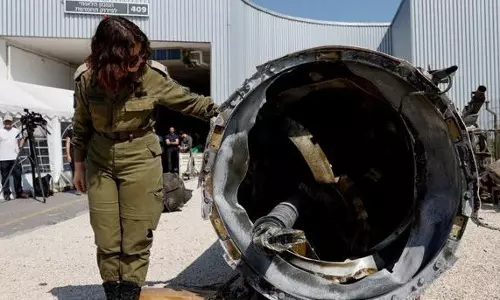
Afghan peace deal: Trump's trap to India
text_fieldsUS efforts to rope in India in intra-Afghan dialogue in the efforts to bring Taliban into the mainstream of power in Afghanistan, has put the Narendra Modi government in a dilemma. Zalmay Khalilzad, Special Representative for Afghanistan Reconciliation, who was in India last week, has asked the government to engage in dialogue with Taliban.
In a meeting with the foreign affairs minister S. Jaishankar and National Security Advisor Ajith Doval, Khalilzad put forward US's demand to India to take part more actively in the Afghan peace process. India thinks that a direct talk with Taliban, who have been ostracized so far, will be suicidal. Moreover, the Modi government is largely pessimistic of the Islamist group's future. In the US proposal submitted by Khalilzad, India is asked to solve all the concerns through dialogue and to actively participate in the reconstruction and development of Afghanistan. However the Centre fears that being a pawn succumbing to the American plan for an exit and its political interests in the region will put the country in a trap. India is disturbed over the antecedents of Taliban and the links it has with foreign groups aiding militancy overtly or covertly in Jammu and Kashmir. However Modi is not powerful to resist the peace process initiated by his intimate friend, Donald Trump, who wants to accelerate the troops withdrawal from Afghanistan before the US presidential election.
The US-Taliban peace deal, a result of decade long negotiations, is testimony of failure of the unilateral Afghan invasion following the 9/11 World Trade Centre attack. Therefore, US looks forward to a dignified exit from Afghanistan. To this end, the Trump administration is trying to ally all the countries in the region and the Afghan government in the process. The Afghan government was not made a party in the peace process with Taliban. However the US administration has put the responsibility to execute the agreement - made between the two parties - on others. Taliban is vying to pull together whatever it can before US withdrawal and secure its future. America is mounting pressure in varying degrees on the parties involved to implement transfer of power to Taliban as no other options are viable to exact the withdrawal. Lately, US has solved the dispute between the Afghan president Ashraf Gani and his rival Abdullah Abdullah by threatening to end the aids supplied. Washington is mainly aiming at the release of its soldiers imprisoned by Taliban. The soldiers' release was ensured by reciprocal release of Taliban prisoners in US custody. To gratify the Afghan government who supported the peace deal, it ensured the release of 5,000 Afghan soldiers. According to the deal, Taliban was supposed to release 1,000 Afghan soldiers in exchange of its 5,000 members. However, Afghan government alleges that Taliban is not keeping the word and alleges that 610 persons were missing in the list of 1,000 it had given. There is a section among Taliban who do not favour peace talks with the US. It is believed that these groups may venture to revenge by allying with IS Khurasan and Pak Al Qaeda. It's pointed out that these dissatisfied groups are behind the recent attacks on Sikh religious institutions.
India is being dragged by US to such a troubled front. India, which spent three billion dollars in Afghan's development and gave training to its soldiers, is keeping itself away from a political interference. India is bound by several regional constraints in this regard. India is cautious after it was not invited to the US-Russia talks held by the UN, involving six neighbouring countries as part of the US-Taliban talks. Imperialism may have its own strategies in involving India to avoid the obstacles in the way of peace deal implementation. But can the Modi government read into the ploy and dodge them?























